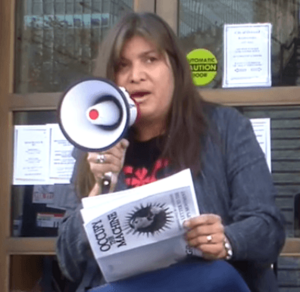Waziyatawin facts for kids
Quick facts for kids
Waziyatawin
|
|
|---|---|

Waziyatawin in 2011
|
|
| Born |
Angela Lynn Cavender
February 13, 1968 |
| Other names | Angela Cavender Wilson |
| Education | University of Minnesota Cornell University |
| Scientific career | |
| Thesis | De Kiksuyapo! (Remember This!): The Eli Taylor Narratives and Dakota Conceptions of History (2000) |
Waziyatawin is a Dakota professor, author, and activist. She is from the Pezihutazizi Otunwe (Yellow Medicine Village) in southwestern Minnesota.
She studies the important roles of Indigenous women. Her work focuses on how they stand up against unfair rule. She also helps bring back Indigenous knowledge and traditions. Waziyatawin believes in telling the truth as a way to heal past wrongs.
She has written and edited many books. These books are about Dakota history and how Indigenous people resist. They also share ways for Indigenous communities to become strong and independent again.
Waziyatawin is known as a leading Indigenous thinker. She was a special professor at the University of Victoria in Canada. There, she focused on how Indigenous people can govern themselves. She also taught at Arizona State University from 2000 to 2007.
Early Life and Education
Waziyatawin was born Angela Lynn Cavender in 1968. Her birthplace was Virginia, Minnesota. Her father, Chris Mato Nunpa, was a professor of Indigenous studies. Her mother, Edith Brown Travers, worked in social services. Waziyatawin spent her childhood both on and off the Upper Sioux Indian Reservation.
She studied history and American Indian studies. She earned two degrees from the University of Minnesota in 1992. Later, she earned her master's (1996) and doctoral (2000) degrees in history. These were from Cornell University. Her Ph.D. project was based on stories from her grandfather. She later published these stories in a book called Remember This! Dakota Decolonization and the Eli Taylor Narratives.
In 1998, something important happened. Waziyatawin's eight-year-old daughter came home upset from school. Her teacher had read Little House on the Prairie in class. In the book, a character says, "The only good Indian is a dead Indian." Waziyatawin, like other Indigenous educators, felt the book showed Native Americans unfairly. It used harmful stereotypes. Waziyatawin tried for months to get the school to stop using the book. However, she was not successful.
In 2007, she officially changed her name. She went from Angela Cavender Wilson to Waziyatawin. An elder gave her this name when she was a child. It means "woman of the north."
Academic Career and Research
Waziyatawin became a tenured professor at Arizona State University. She taught there until 2007. In 2004, she edited her first book. It was called Indigenizing the Academy: Transforming Scholarship and Empowering Communities. She worked on it with Devon Abbott Mihesuah.
In 2005, she edited another book. This one was For Indigenous Eyes Only: A Decolonization Handbook. She worked with Michael Yellow Bird on this project. The book includes essays from eight Indigenous American scholars.
In 2008, she joined the Indigenous Governance Program. This was at the University of Victoria. She became a Canada Research Chair in Indigenous Peoples. She said she liked the program's goal to help Indigenous people gain freedom and take action.
Waziyatawin is seen as a very important Indigenous thinker. Her research looks at how Indigenous women resist unfair systems. She also works to bring back Indigenous knowledge. She believes in telling the truth to help heal communities. Waziyatawin has written or edited six books. These books cover Dakota history, Indigenous resistance, and ways for communities to become independent. She also started Oyate Nipi Kte. This is a non-profit group. It works to bring back Dakota traditional knowledge. It also supports sustainable ways of living and Dakota freedom.
Activism and Advocacy
Waziyatawin became well-known as an activist in 2007. She was arrested several times while protesting. These protests were against Minnesota's 150th anniversary celebration. The protests aimed to highlight broken treaties. They also brought attention to unfair actions against Indigenous people. This included the hanging of 38 Dakota men. This happened during the Dakota War of 1862. It was the largest mass execution in American history.
In 2010, a newspaper published a letter. It was from a student who heard Waziyatawin speak. The student claimed Waziyatawin encouraged violence. Waziyatawin responded to this claim. She told CBC News that she does not directly call for violence. However, she believes Indigenous people have the right to defend themselves. This includes defending their people and their land. She stated she never supported violence against white settlers. The FBI later contacted her but closed the case.
Waziyatawin has also connected different struggles for freedom. She sees links between the Israeli-Palestinian conflict and unfair settlement in North America. In 2011, she visited Palestine. She went with a group of Indigenous and women of color scholars and artists. This group included Angela Davis. After their trip, the group supported the Boycott, Divestment and Sanctions (BDS) movement. This movement uses economic pressure to support Palestinian rights.
Personal Life
Waziyatawin is married to Scott Wilson. She divides her time between Minnesota and Victoria, British Columbia. Victoria is in the traditional lands of the Coast Salish people.
 | Ernest Everett Just |
 | Mary Jackson |
 | Emmett Chappelle |
 | Marie Maynard Daly |

